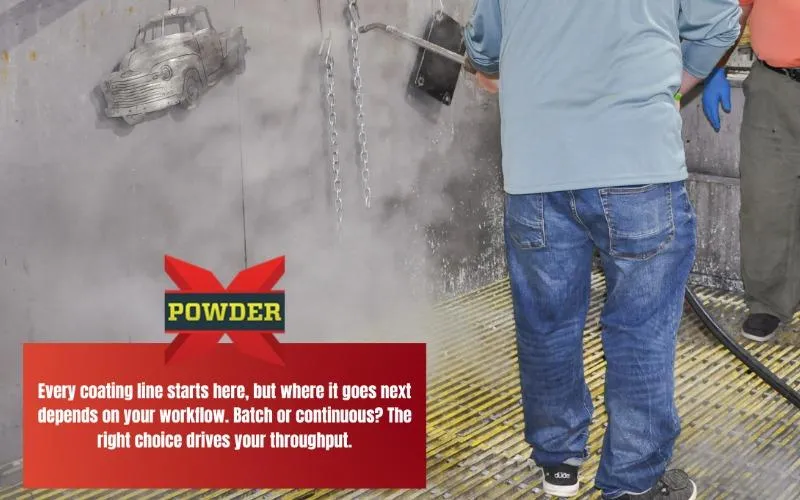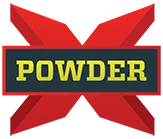
Batch vs. Continuous: What's the Right Powder Coating Workflow for Your Shop?
If you are setting up or expanding your powder coating operation, there is one question you have to get right from the start: should you choose a batch or continuous powder coating system?
“Should I run a batch system or invest in a continuous line?”
The wrong answer won't just slow you down, it will choke your cash flow, blow out your space, and leave you watching competitors ship jobs you couldn’t even quote.
In this post, we’ll break down:
What each layout looks like
How throughput and shop footprint are affected
When to switch from batch to continuous (and why timing matters)
Option 1: Batch Powder Coating Systems
Batch systems are modular, flexible setups where parts move from station to station manually. Think:
Wash > Dry > Coat > Cure
Best for:
Custom fab shops
Job shops with high part variation
Short runs or specialty colors
Startups building their powder coating revenue base
Pros:
Lower upfront cost
Easier to install in smaller spaces
Simple to train and scale staff
Easily adapted to part variety and low volumes
Cons:
Slower throughput (limited by part handling and cure cycle overlap)
Labor-dependent: moving racks, loading/unloading ovens manually
Limited real-time tracking and automation
Higher chance of bottlenecks when volume increases
“Batch systems are perfect if you’re starting lean, but not so great if you’re already buried in orders.”
Option 2: Continuous Line Powder Coating Systems
Continuous lines move parts via conveyor through a series of fixed stations:
Auto wash → Dry-off → Spray booth → Cure oven → Cool-down → Unload
These are engineered for high-speed, high-volume production.
Best for:
OEMs and contract manufacturers
Repeat production of uniform parts
High-volume facilities with tight takt times
Operations looking to integrate robotics and automation
Pros:
Dramatically higher throughput
Tight process control and timing
Consistent coating quality (ideal for Mil-Spec or ISO jobs)
Lower per-part labor cost long-term
Cons:
Higher upfront investment
Requires detailed planning and facility layout
Not ideal for shops with wide part variation
Needs enough volume to justify the footprint and power draw
“Continuous lines don’t flex like batch systems, but they don’t miss deadlines either.”
Throughput: How Fast Do You Need to Go?
Let’s say you’re coating:
50 parts/day now
Want to scale to 250 parts/day
Each part needs 2 minutes of spray time and 20 minutes cure time
With a batch system, you may process 40 – 80 parts/hour depending on part size and oven staging.
With a continuous line, that number can jump to 200 – 300+ parts/hour and it runs while your team resets for the next shift.
Footprint: What’s Your Real Estate Reality?
Batch System:
Fits in 1,000–2,000 sq ft
Can be added to existing shops with minimal remodeling
More layout flexibility (systems can be “wrapped” around walls)
Continuous Line:
Requires dedicated production lane: 80–200+ linear feet
Needs space for conveyor returns, utilities, and access
Better suited to new construction or full facility redesign
Joey Tip: “If you’re short on space but long on hustle, go batch. If you’ve got the floor and the flow, go continuously.”
So… Which Is Right for You?
Ask yourself three questions:
What’s my part volume today and where do I want it in 2 years?
Do I need flexibility in part size, color changes, or substrates?
Do I have the physical and financial room to scale now or should I grow into it?
If you’re starting or scaling, batch lets you walk before you run.
If you’re chasing OEM contracts or building a just-in-time workflow, continuous lines are the long-term weapon.
“Your workflow isn’t just about what fits, it’s about what makes you competitive.”
Final Word: Layout Is Strategy
Don’t let your shop layout be an afterthought. Whether you’re coating a few brackets or running production for aerospace, your throughput, footprint, and margin depend on this decision.Need help designing the right flow for your floor plan?
We do this every day, with shops just like yours.
